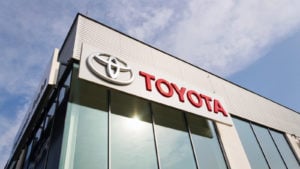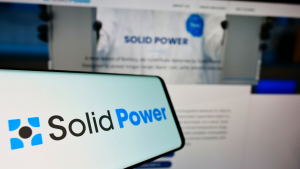
As the world pivots towards sustainable transportation and energy, batteries have become the cornerstone of modern revolution. Despite the dependence on geographically concentrated and scarce metal resources, the sector remains on the cusp of a major transformation. In its most lucrative long-term market in EVs, breakthroughs, such as solid-state and sodium-ion batteries, could redefine the landscape. This shift comes at a time when the EV market’s demand curve is projected to steepen once again, offering an attractive window of opportunity. Therefore, multibagger battery stocks represent not just an investment in the booming demand for energy storage but also in the technological leap expected to drive the next wave of EV adoption. With that said, here are seven multibagger battery stocks offering robust long-term upside ahead.
Albemarle (ALB)

Albemarle’s (NYSE:ALB) journey through over a 50% correction over the past year raises eyebrows, but there’s a silver lining. With the likelihood of a lithium shortage by 2025, ALB’s stock shimmer holds incredible value, trading at just 1.5 times forward sales estimates. Lithium, often dubbed the lifeblood of batteries, is poised for a price surge in the next 12 to 24 months, and ALB is set to benefit immensely with a resurgence in top and bottom-line growth ahead.
Despite a recent dip in earnings and a cautious revision of its full-year guidance, Albemarle’s fundamentals remain as robust as ever. The company isn’t just weathering the storm; it’s expanding its horizons at a healthy pace. From a lithium conversion capacity of 200ktpa in 2022, it’s boldly aiming for a 600ktpa capacity by 2027. This ambitious growth strategy positions Albemarle to not just ride the wave but to lead the charge in the battery stock market.
Toyota (TM)

Toyota (NYSE:TM) has been making major headway in the battery sphere, a major shift from its traditional automotive focus. With a massive investment that has swelled from $5.6 billion to over $9 billion, the company is gearing up to commence battery production next year. Critical to this venture is the new North Carolina battery plant, representing a whopping $6 billion investment and expected to be operational by 2025. It invested a whopping $8 billion more into its North Carolina battery plant in October. This facility will boast six battery production lines, diversifying its output to cater to both hybrid and battery EVs.
Toyota’s ambitions don’t end with internal production. The company is forging strategic partnerships, mainly with LG for battery supply and with Idemitsu for the mass production of its solid-state batteries. This collaborative approach combines Toyota’s manufacturing strengths with the tech expertise of its partners, aiming to start production by 2027 or 2028.
The company aims to have 10 active battery production lines by 2025, eventually expanding to 70. Moreover, this expansion, coupled with partnerships like the one with LG Energy Solution, highlights Toyota’s drive to increase its market share in the evolving battery industry.
Panasonic (PCRFY)

Panasonic (OTCMKTS:PCRFY) is one of the most popular names in the battery sphere, notable for its alliance with EV pioneer Tesla. The company announced an incredibly bold plan to boost its annual production capacity for EV battery cells, targeting a massive increase to 200 GWh by March 2031. This ambitious goal represents a fourfold increase in its current battery production capacity.
The decision to expand is driven not only by the burgeoning EV market but also by Panasonic’s exploration of innovative battery technologies. These include cobalt-free options and cells boasting an energy density of 1,000 Wh/l. Furthermore, it boasts 445 patents in solid-state batteries making significant strides in enhancing battery durability and density. Therefore, given the dynamics of the current EV sector, where market shares are continuously shifting, Panasonic stands as a seasoned player in the battery realm. Its established position, coupled with innovative advancements and ambitious growth plans, makes it a compelling choice for investors looking to capitalize on the evolving battery sector.
QuantumScape (QS)

QuantumScape (NYSE:QS) has experienced a topsy-turvy 2023, with its stock prices fluctuating considerably yet remaining relatively flat year-to-date. However, the potential of its solid-state EV batteries positions the firm for possible future long-term expansion. As a pre-revenue firm, QuantumScape’s focus is on developing advanced solid-state batteries, promising higher energy density, cost-effectiveness, and enhanced safety compared to traditional lithium-ion batteries. These batteries, lighter and smaller, leading to more efficient and economical vehicle designs.
The scientific foundation behind QuantumScape’s solid-state batteries remain robust, supported by extensive research highlighting their advantages. Moreover, QuantumScape’s recent financial report shows a substantial cash reserve, providing a runway of approximately 2.5 years given their current burn rate. Investors considering that a company should be mindful of the inherent risks associated with a pre-revenue firm, especially in terms of capital depletion.
Honeywell (HON)

Honeywell (NASDAQ:HON) remains a standout choice for investors in the battery stock sphere. Known as the nerve center across a myriad of industries, Honeywell presents a relatively appealing low-risk option for those looking to wager on battery stocks. Its recent financial performance underscores its strength, with a notable 3% increase in total sales to $9.2 billion, alongside a 10% surge in orders pushing its backlog to a record $31.4 billion.
More than just robust financials, Honeywell’s diverse energy storage solutions are a key part of its allure. The company’s portfolio includes lithium-ion, flow, and hydrogen batteries, covering multiple discharge cycles, from four-hour and 10-hour to long-term. These energy storage systems fall under its popular Performance Materials and Technologies segment, which continues to exhibit healthy long-term growth.
Additionally, Honeywell offers investors a sense of stability with a 2% dividend yield, backed by a history of 21 consecutive years of dividend payments. This blend of financial strength, technological diversity, and a reliable dividend track record positions Honeywell as a compelling long-term option for those seeking a balanced investment in the battery industry.
Solid Power (SLDP)

Solid Power (NASDAQ:SLDP) is another significant player in the solid-state battery technology sector, drawing attention to its robust financial performance. In the third quarter, the firm reported substantial sales of $6.4 million, marking a hefty increase of $3.6 million compared to the same period in 2022. Over nine months, Solid Power’s revenue hit $15.1 million, a size-able jump of $7.5 million, signaling robust growth momentum. However, this growth comes at a cost, with increased operating expenses reflecting Solid Power’s powerful growth investments in product development and operational expansion.
The company reported an operating loss of $21.5 million for the third quarter of 2023, alongside a net loss of $15.1 million. On the business development front, Solid Power has achieved a milestone by delivering its first A-1 EV cells to BMW (OTCMKTS:BMWYY). This delivery marks a critical step in the formal automotive qualification process, opening doors for future collaborations. Additionally, the company is transitioning from its SP1 production to ramping up electrolyte production at SP2, signifying its commitment to scaling operations to meet the needs of potential partners.
Lithium Americas (LAC)

Lithium Americas (NYSE:LAC) is a big name in the lithium market, showcasing its potential through several key projects. The Thacker Pass project in Nevada is the centerpiece of its portfolio, promising an impressive future with a stellar after-tax net present value exceeding $5.5 billion. Set to commence in 2026, Thacker Pass could potentially yield a whopping 80,000 tons of lithium carbonate equivalent (LCE) annually.
Moreover, LAC isn’t hitching its hopes on the Thacker Pass alone as its Cauchari-Olaroz project in Argentina, a joint venture with China’s Ganfeng Lithium (OTCMKTS:GNENF), is set to produce a massive 40,000 tons of LCE per year. Additionally, the company’s Pastos Grandes project, also in Argentina, will further boost its output with an expected annual contribution of 24,000 tons of LCE starting in 2024. Furthermore, Analysts are optimistic, predicting a swing toward profitability for LAC within the next 12 months. In a nutshell, while there’s a bit of a wait before its major projects go live, the strategic partnerships and projected outputs place LAC in a promising spot within the lithium market.
On the date of publication, Muslim Farooque did not have (either directly or indirectly) any positions in the securities mentioned in this article. The opinions expressed in this article are those of the writer, subject to the InvestorPlace.com Publishing Guidelines




